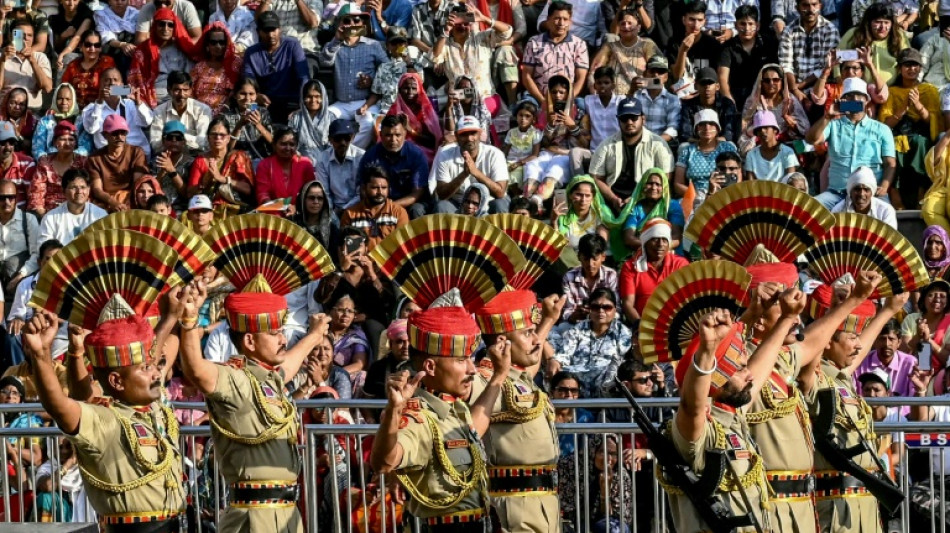

No handshake at muted India-Pakistan border ceremony
With swaggering soldiers giving high kicks set to booming patriotic music cheered on by crowds, it was the usual daily border ceremony between nuclear-armed arch-rivals India and Pakistan.
But there was one key thing at the show that was missing -- the usual symbol of cooperation, a handshake between the opposing soldiers, did not take place.
Relations have plummeted after New Delhi accused Islamabad of backing an attack targeting tourists on April 22 -- the deadliest attack on civilians in Indian-administered Kashmir for years.
Islamabad rejects the claims, and the countries have since exchanged gunfire, diplomatic barbs, expelled citizens -- and ordered the border to be shut.
The iron gates that separate the two sides remain locked.
"It just fills you with passion and patriotic pride", said Simarjeet Singh, 17, from the nearby Indian city of Amritsar, his face painted with the national tricolour flag.
Many fear the risk of a military escalation in the coming days.
- 'Cheering' -
For years, the Attari-Wagah border in Punjab has been a hugely popular tourist attraction.
Visitors from both sides come to cheer on soldiers goose-stepping in a chest-puffing theatrical show of pageantry.
Numbers were muted at the sunset show on Saturday, but thousands of Indians still came to show their loyalty to their nation.
"There were people from all over who looked and dressed different but were cheering and screaming at the same time -- for our country and the soldiers," Singh said, who came with his friends from college.
Cheering crowds still filled the stadium-like space around the gates with noise, at least on the Indian side, where on Saturday some 5,000 people -- about a fifth of full capacity -- watched.
There was only a small fraction of the support on the Pakistani side.
Enthusiastic spectators sang in chorus, waving flags and chanting "India Zindabad", or "Long live India".
The frontier was a colonial creation at the violent end of British rule in 1947 which sliced the sub-continent into Hindu-majority India and Muslim-majority Pakistan.
The daily border ritual has largely endured over the decades, surviving innumerable diplomatic flare-ups and military skirmishes.
Reena Devi, 54, and PK Nath, 70, tourists from Tezpur in India's northeastern state of Assam, are part of a tour of the country.
"We are just so excited to be here", Devi said. "We just wanted to see this ceremony and experience being at the border with Pakistan."
Nath said she and her group planned to visit a Hindu site in Jammu and Kashmir.
"Some of us are now a little apprehensive about the security there", she said.
Nath said he "totally supported" New Delhi's decision to expel Pakistani citizens and to shut down the border.
"You can't send people to kill here and still not expect any response," Nath said.
"We don't know what will happen next but we are sure that the government would do the right thing," he added.
As the energetic masters of the ceremony goaded the crowd, the Indian soldiers in red-fanned hats stomped up to the locked gate, kicking their legs up -- with Pakistanis doing the same on the other side.
- 'Anger' -
Aside from the ceremony, Indian and Pakistani citizens have been crossing the border since both sides cancelled visas before India's April 29 deadline to leave -- tearing apart families with relations in both nations.
"There is obvious anxiety right now", said Harpal Singh, an Amritsar-based taxi driver who regularly brings visitors to the ceremony, insisting the spectacle was still worth coming to see.
"There was no one who didn't come back impressed and excited", he said.
KT Ramesh, 57, from Kozhikode in the southern state of Kerala, said that even the scaled-down ceremony "was worth it".
"There was no shortage of passion among our people," Ramesh said.
He said that he'd "seen anger" about the attack in Kashmir "in whoever I spoke with, from our hotel staff to the taxi driver and other tourists here".
"Everyone was talking about it," he said. "We don't like a war but this time we must teach them a lesson".
M.Walker--VC






